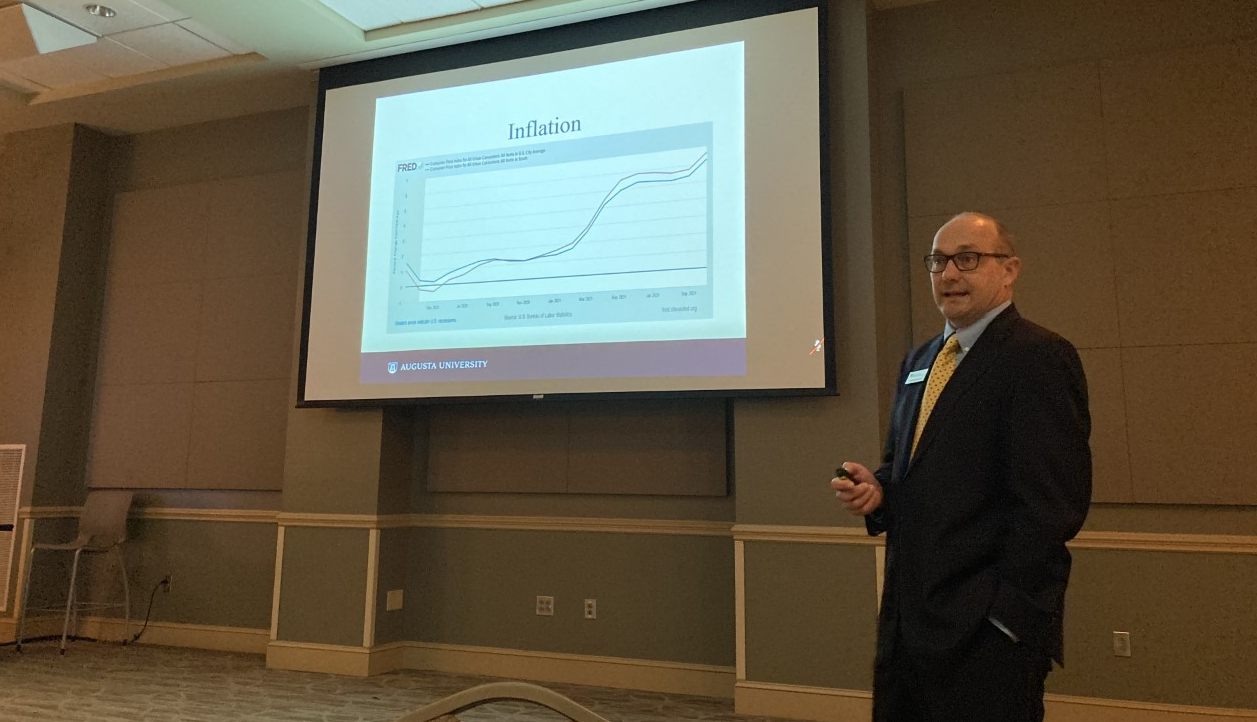Dr. Simon Medcalfe, a professor in Augusta University’s James M. Hull College of Business, doesn’t see a rosy picture for the area’s economic future.
“There are concerns heading in 2022. Job openings were at record levels when they released the data yesterday. But we have to got to get people back into work,” he said in his address at the Economic Forecast Breakfast in the Roscoe Williams Ballroom on Augusta University’s Summerville Campus on Thursday, Dec. 9. “Other cities in the state have been able to do that.”
Medcalfe is the author of Augusta’s Leading Economic Index (LEI), a monthly composite index that combines several national, regional and local indicators into a single variable. He provided both finance and employment data in his address to the attendees.
“Let’s talk about inflation. It’s up about 6.2% nationally. People want to know if it’s transitory or persistent,” Medcalfe said. “It seems there are thoughts this is not a transitory issue.”
MORE: Community Leaders Discuss How to Combat Workforce Issues at Chamber Event
Medcalfe said the Federal Reserve has had to balance employment with inflation and price stability. Employment has been their bigger focus with so many industries clamoring for workers after so many exited the workforce during the pandemic.
As a result, the economy has been flush with cash from economic stimuli, and the population has a cash cushion that’s kept them from being as keen to re-enter the workforce. The government had paid people thousands of dollars not to work during the pandemic, Medcalfe said, and now many of them had gone a different direction, not coming back to their former place of employment.
Locally, Medcalfe said some of his students undertook an economic analysis of Savannah River Site’s economic impact on the area.
[adrotate banner=”51″]
In 2020, the impact on the CSRA was nearly 16,000 jobs and $2.2 billion, the students found. Those marks were down a bit from the last time this study was conducted in 2016, when the impact was $2.4 billion and just over 18,000 jobs.
Three of the industries in the CSRA that were affected the most were leisure and hospitality, healthcare and retail-centric.
“In healthcare, we are still down about 1,000 jobs from our pre-pandemic levels,” Medcalfe said. “Leisure and hospitality was obviously hit hard both locally and nation-wide. In this area, we lost about 12,000 jobs immediately.”
MORE: The Benefits Cliff is Silently Curbing the Workforce
Retail, however, has been a bright spot in an overall dark period.
“Retail has bounced back. Over 29,000 people are employed in the area now in retail-centric jobs,” Medcalfe said. “It makes sense with all the fiscal stimulus from the government spurring on extra spending.”
Furniture sales are up 29%. Used cars and cars in general are up 25%. Electronics are up nearly 30%. Clothing is up 50%, according to the most recent data, the professor said.
Goods spending is up a trillion dollars compared to pre-pandemic levels, Medcalfe said, due to the fact of events and activities being preferred less than having a nicer TV or a better bed to sleep in while people are spending so much time at home.
[adrotate banner=”15″]
Medcalfe said the question of “Where are the workers?” has a couple answers. The financial cushion above is a big reason, more concerns about child-care and elderly care have more parents and children of ill or elderly parents staying home.
“Where have the workers gone from a local perspective?” Medcalfe asked the audience. “I can tell you that: Savannah.”
Medcalfe said Savannah’s employment levels in 2021 are up 13,000 people. The city’s employment level is higher than pre-pandemic, and the same is true for Valdosta and Warner-Robbins. Augusta is still 2.5% down from pre-pandemic levels, which is about the national average.
And he ended his presentation with a dim view.
Medcalfe mentioned a decline in earnings and purchasing power due to inflation from economic stimulus as persisting concerns, as well as continued uncertainty from the pandemic itself, with a new variant now entering our purview.
“How will a new variant affect our economy?” he asked. “That is hard to say.”
Tyler Strong is the Business Editor for The Augusta Press. Reach him at tyler@theaugustapress.com










